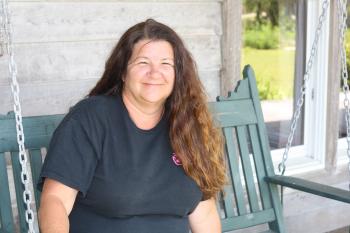Pam Davis Morris

1997 North Carolina Fisheries Reform Act
The Fisheries Reform Act is the most significant fisheries legislation in NC history.
In 1994, the North Carolina General Assembly approved a moratorium on the sale of new commercial fishing licenses and established the 19-member Fisheries Moratorium Steering Committee to oversee a study of the state's entire coastal fisheries management process and to recommend changes to improve that process. The Moratorium Steering Committee included legislators, fisheries managers, scientists, commercial fishermen, and recreational fishermen. The committee commissioned six research studies and reviewed a broad range of issues, including fishing licenses, fishing gear, habitat protection, agency organization, and law enforcement. The committee issued a draft report in the late summer of 1996, held 19 public meetings across the state, and adopted a final report in October 1996 that formed the basis for the Fisheries Reform Act. Governor James B. Hunt signed the Act into law on August 14, 1997.
The 1997 North Carolina Fisheries Reform Act: An Oral History Perspective was made possible by the North Carolina Sea Grant Community Collaborative Research Grant Program.
Mary Williford
Pam Davis Morris was born in Newport News, Virginia in 1962. Her father was an engineer and her mother was a medical technician. The family moved to Beaufort, North Carolina when she was five years old, and later, Smyrna, North Carolina. Morris began her career in the seafood industry at a young age, working at a fish house and heading shrimp when she was just fifteen. She attended college at the University of North Carolina at Charlotte, where she earned degrees in Art and Art Education. After graduating, she became a commercial fisherman, working as a shrimp fisherman, a gill net fisherman, and a clammer. She continued to work in the industry during her college summers. In the 1980s, Morris began attending fisheries meetings, initially about clams. She has been involved in fisheries management and policy ever since, including involvement with the Carteret County Fisherman’s Association. She has also been a vocal advocate for the rights and recognition of commercial fishers, particularly in the face of shifting public perceptions and regulatory changes.
Scope and Content Note
This interview with Pam Davis Morris, conducted by Barbara Garrity-Blake on June 7, 2016, provides a detailed account of Morris' life and career in the commercial fishing industry in North Carolina. The interview covers a range of topics, including Morris' personal and professional background, her early work in Down East fish houses, and her experiences attending her first fisheries-related meeting in the 1980s. Morris discusses her experiences as a commercial fisherman, including her work as a shrimp fisherman, a gill net fisherman, and a clammer. She also talks about the challenges and changes she has witnessed in the industry, including the impact of the Fisheries Reform Act and the moratorium on commercial fishing licenses. The interview also touches on the local seafood movement and shifting public perceptions of commercial fishers. Morris shares her thoughts on the "radical elements" in fisheries management today and the programs and giveaways offered by Carteret Catch. Morris also discusses her involvement with the Carteret County Fisherman’s Association and her experiences with fisheries meetings and policy discussions. She shares anecdotes about a brawl at a public meeting on clam kicking in the 1980s and her interactions with other key figures in the industry. The interview concludes with Morris sharing her thoughts on the future of the commercial fishing industry and the next generation of "fighters" for the industry. She also discusses her views on the local seafood movement and the role of various federal councils and council representatives from the state. Throughout the interview, Morris provides a unique and personal perspective on the commercial fishing industry in North Carolina, offering insights into the challenges and changes she has witnessed over the years. Her experiences and views provide valuable context for understanding the complexities of fisheries management and policy, as well as the ongoing struggles and resilience of commercial fishers.
Please Note: The oral histories in this collection are protected by copyright and have been created for educational, research and personal use as described by the Fair Use Doctrine in the U.S. Copyright law. Please reach out Voices@noaa.gov to let us know how these interviews are being used in your research, project, exhibit, etc. The Voices staff can help provide other useful resources related to your inquiry.
The NOAA mission is to understand and predict changes in climate, weather, oceans, and coasts, to share that knowledge and information with others, and to conserve and manage coastal and marine ecosystems and resources. The Voices Oral History Archives offers public access to a wide range of accounts, including historical materials that are products of their particular times, and may contain offensive language or negative stereotypes.
Voices Oral History Archives does not verify the accuracy of materials submitted to us. The opinions expressed in the interviews are those of the interviewee only. The interviews here have been made available to the public only after the interviewer has confirmed that they have obtained consent.
